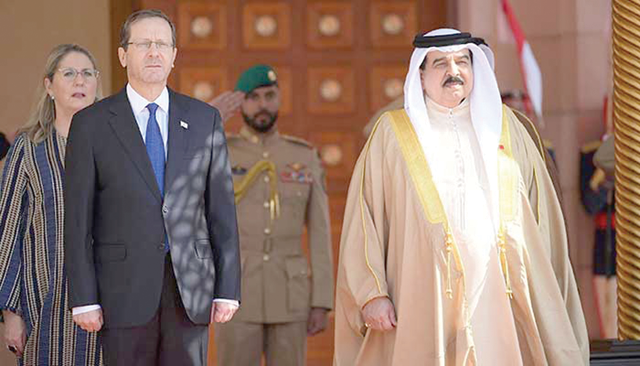You are here
UAE opens Israel embassy after normalisation deal
By AFP - Jul 15,2021 - Last updated at Jul 15,2021
TEL AVIV — The United Arab Emirates opened an embassy in Israel Wednesday, housed in Tel Aviv's new stock exchange building, in the latest normalisation move under a deal brokered by Washington last year.
The venue in the heart of Israel's financial district highlighted the central role of economic cooperation in their ties since the UAE became only the third Arab country to recognise Israel.
At the ceremony, attended by new Israeli President Isaac Herzog, Emirati ambassador Mohammad Al Khaja called the embassy opening "an important milestone in the growing relationship between our two countries".
"The UAE and Israel are both innovative nations, we can harness this creativity to work towards a more prosperous and sustainable future for our countries and our region," he said.
Herzog called for the "historic agreement" with the UAE to be "extended to other nations seeking peace with Israel".
Israel and the UAE have signed a raft of deals ranging from tourism to aviation to financial services since normalising ties in a deal brokered by former US president Donald Trump's administration and
announced last August.
Wednesday's ceremony, held in the lobby of the stock exchange building two floors below the embassy, came after Israeli Foreign Minister Yair Lapid made a landmark visit to the UAE last month, opening an embassy in Abu Dhabi and a consulate in Dubai.
The Palestinians were outraged by the UAE's decision to establish ties with Israel, which broke with decades of Arab consensus that there should be no such normalisation without a comprehensive and lasting peace between Israel and the Palestinians.
Following the UAE deal, Israel led by then-prime minister Benjamin Netanyahu normalised relations with Bahrain, Morocco and Sudan, in a string deals known as the Abraham Accords.
Israel and the UAE have sought to capitalise on their new ties with a string of economic agreements.
Lapid was an architect of the coalition that ousted Netanyahu last month, but has, along with Prime Minister Naftali Bennett, vowed to keep up Netanyahu’s policy of pursuing deeper ties in the Arab world.
While less than a year old, the new agreements with the UAE and other Arab states have already had the opportunity to prove their resilience, according to Yoel Guzansky, a researcher at Israel’s Institute for National Security Studies think tank.
Related Articles
ABU DHABI — Israel's top diplomat Yair Lapid opened Tel Aviv's first embassy in the Gulf during a trip to the United Arab Emirates on Tuesda
TEL AVIV — Israel and the United Arab Emirates agreed to visa-free travel on Monday, an unprecedented arrangement between Israel and an Arab
MANAMA — Israeli President Isaac Herzog visited Bahrain on Sunday on the first trip by an Israeli head of state to the small Gulf kingdom, f

















